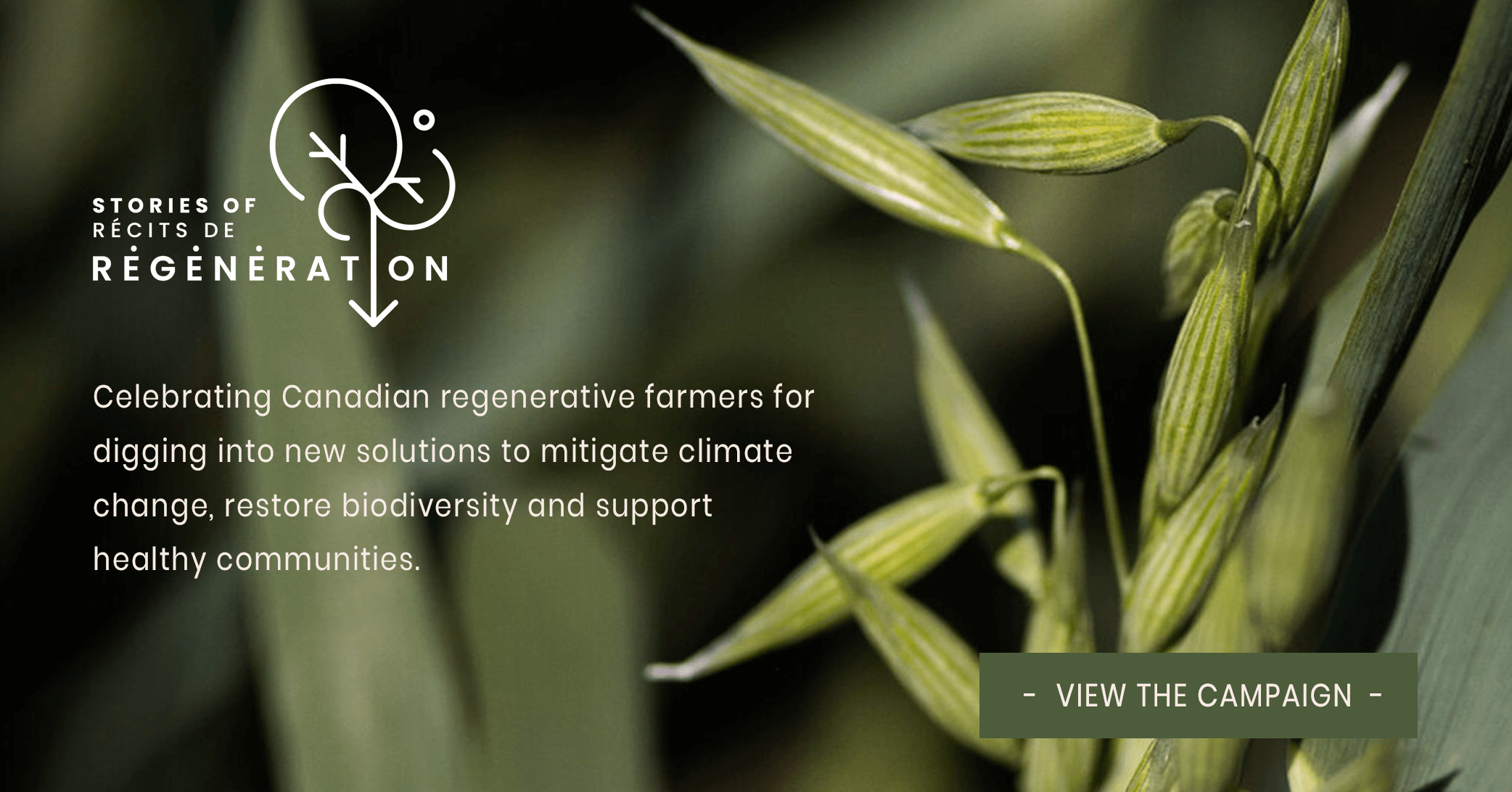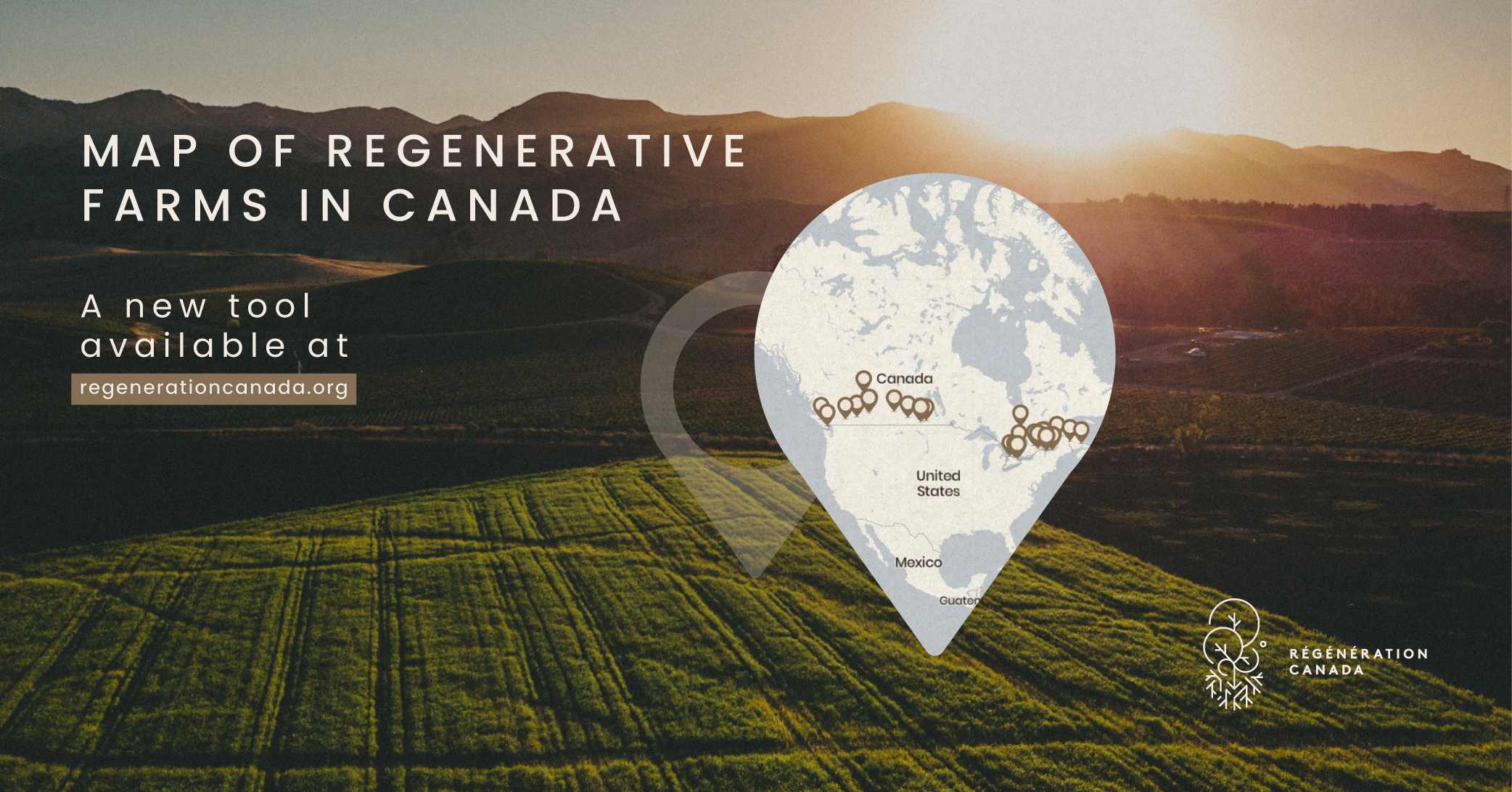SUMMARY
Regeneration Canada is currently supporting a research lab at McGill University led by Dr. Cynthia Kallenbach. It explores crop diversity’s role in climate adaptation, particularly its impact on precipitation patterns, soil health, microbial diversity, and pesticide use. Through field experiments and digital modeling, the study aims to equip farmers with evidence-based strategies for climate resilience. By fostering collaboration and knowledge exchange, the research seeks to advance regenerative agriculture, promoting crop diversity and resilience in Quebec’s farming landscape. What sets this research project apart is its commitment to ongoing engagement with Quebec farmers to ensure practical relevance and long-term impact.
In 2023, Southern Quebec was hit with its wettest July on record in over 50 years, which highlighted the escalating impacts of climate change. As floods and persistent wet weather set in, farmers in Southern Quebec faced significant challenges to their growing seasons, and they aren’t alone. As weather patterns become increasingly unpredictable and intense, farmers everywhere are consistently having to adapt to new realities. It’s partly why regenerative agriculture has become such an attractive approach to farmers in a context where enhancing resilience is critical. Regenerative agriculture recognizes that soil health is at the heart of agricultural resilience. Healthy soil can soak up and retain water like a sponge, which is crucial when there is too much or too little rain.
Farmers are exploring old and new strategies of enhancing soil health as a means of fortifying their farms against the uncertainty of climate change. One such strategy, currently being studied by researcher Dr. Cynthia Kallenbach and a team of over 10 students and professors at McGill University, is crop diversity. Indeed, crop diversity could be the key to keeping our farms resilient, no matter what comes their way. While there exists a wealth of anecdotal evidence and on-farm experimentation highlighting the benefits of diverse cropping systems, formalizing this knowledge is essential for maximizing its impact.
By studying the role of crop diversity in climate resilience, researchers aim to provide farmers with evidence-based strategies to navigate these new challenges and offer a pathway toward greater stability in the face of environmental stressors.

At its core, the research asks: can biodiversity be used as a tool to mitigate the effects of climate change?
The research will also examine if crop diversity leads to an increase in diversity of soil microbial life and if it improves soil organic matter stability and storage. Furthermore, if these conditions are observed, does crop diversity lead to farmers reducing their reliance on pesticides? Do farms become more resilient to a changing climate and more challenging precipitation patterns, such as more rain in the spring and fall and increased drought conditions in the summer?

Dr. Kallenbach and her team have set up a number of test plots at the McGill campus to investigate these questions. The experiment looks at two factors: crop diversity and precipitation. She is experimenting with seven crop diversity combinations and three precipitation levels. Precipitation will be controlled by rain shelters over the plots, and irrigation. Soil and crop conditions will be monitored closely throughout the experiment using sensors, data loggers, and various tests. This is the first research trial in Canada that emphasizes the diversity of legumes and small grains under controlled precipitation. Remarkably, precipitation experiments are rare, especially in managed systems.
To fill an important knowledge gap in cropping system design, the research will focus on combinations of legume and small grain crops including spring wheat, dry bean, rye, white clover, and KernzaTM (intermediate perennial wheat). While these crops aren’t commonly grown in Québec, this research will demonstrate the functionality and benefits of legume and grain-based systems. Thus, it will provide producers with case studies of opportunities to diversify their crop selection and contribute to the diversity of Québec’s agricultural landscape.
In addition to these field experiments, Dr. Grant Clark, in collaboration with Dr. Kallenbach, is leading the development of a digital model that simulates how these changes affect the entire agricultural system. This digital model will provide insights into microbial interactions as well as nutrient and pesticide cycling.
Why does crop diversity matter?
Part of why our agricultural systems are so deeply impacted by climate change is because of their fragility. Looking at Montéregie and Québec more widely, agricultural production systems are relatively simplistic compared to natural ecosystems, with low species diversity both above and below-ground. Combined with climate change, the rapid loss of agroecosystem biodiversity presents a threat to soil health, meaning soil organic matter degradation, reduced microbial community functions, and poor water retention. This is where crop diversity acts as a stabilizing force, potentially mitigating the impacts of extreme levels of precipitation or drought.
Planting a variety of crops also helps reduce the risk of widespread damage from pests and diseases. Monocultures, where a single crop is grown over large areas, are more susceptible to pest infestations and diseases. With crop diversity, if one crop is affected, others may remain unaffected, protecting food security and providing stability for the farmer.
Additionally, different crops have different root structures and nutrient requirements. Therefore, the implementation of diverse crop planting can help maintain soil health and fertility in the longer term. It can also prevent soil depletion and erosion, enhance nutrient cycling, and reduce dependency on pesticides and synthetic fertilizers. Diverse cropping systems support biodiversity by providing habitats and food sources for a variety of organisms, contributing to agroecosystem resilience and biodiversity conservation.

Farmer insights into the research project
Last February, Regeneration Canada, researchers at McGill and Groupe Pro Conseil brought together a focus group of a dozen farmers from Southern Quebec to gain more insights into their interest in the research project, their motivations for increasing crop diversification and the barriers they face.
What sets this research project apart is its commitment to addressing the real-world needs of farmers. Through focus groups, surveys, and consultations with farmers, the research project ensures that its findings are grounded in the experiences and perspectives of those who will ultimately implement them.
During the focus group, farmers spoke about how they have been integrating crop diversity into their production systems through cover crops with the main objectives of improving soil fertility, reducing compaction, and improving water management. They noticed improved water infiltration and retention, which proved helpful during extreme weather events such as excessive rainfall or drought.
The farmers attributed this positive effect to the presence of living roots, and suggested that perennial plants offer the most effectiveness in water management. However, incorporating perennials into production systems isn’t always feasible, particularly if the farm lacks animals since the major perennial crops are forages, intended for animal consumption. Since many farmers are motivated to safeguard and regenerate their soils, some field croppers opted to go as far as swapping plots with neighbours to integrate hay into their rotation. There’s also considerable interest among field crop producers regarding the potential of perennial wheat, such as KernzaTM, which Dr. Kallenbach is testing out in the experimental plots.
While cover crops are more accessible within a larger gamut of production systems and scales than perennial crops, there are technical challenges involved, particularly in terms of successful establishment, management, and termination. The farmers noted that increased resilience can have positive ripple effects on the profitability of the farm, but the result is not immediate and these practices require investment of time, equipment and capital.
A follow-up survey was sent out in January 2024 where we heard from the same focus group of producers on their 2023 seasons. As mentioned at the top of this article, 2023 was incredibly rainy and wet. Some of the impacts that farmers saw on their fields included: accumulation of water in their fields, more plant diseases than usual, lower yields and in some cases the total loss of certain crops. In heavier clay soils that had difficulty draining, some producers saw signs of plant asphyxiation, where roots were deprived of the oxygen they need because of how saturated the soil was. While many are looking to continue to improve their practices and implement strategies like cover cropping, decompaction, drainage, and using better-adapted equipment, financial factors inevitably come into play. These farmers, as well as others in the region, will continue to be engaged with the research as it progresses.

How will this research impact the status of regenerative agriculture in Canada?
The research project will help regenerative agriculture gain ground in Canada, particularly in Québec, by promoting crop diversity and equipping producers with case studies, evidence and tested-strategies to encourage diversification, moving away from the dependence on corn-soybean rotations that we so often see in Eastern Canada.
Through knowledge mobilization initiatives and active engagement with growers, researchers are trying to bridge the gap between research findings and on-the-ground farming practices, and build trust between researchers and producers. Furthermore, the researchers are committed to implementing effective project planning and management strategies, ensuring the seamless transition of their trials into long-term experimental sites. By doing so, they hope to attract researchers from across Canada and the U.S.
Ultimately, a key anticipated outcome of the research is to give practical timelines and clear measurements of what’s needed for farmers to make the right decisions within the context of climate change. With a better understanding of crop diversification, growers and policymakers can better manage their expectations regarding soil health and agronomic responses to impending changes in precipitation patterns.
This and other research continue to be a key catalyst in a paradigm shift in farming practices, promoting resilience, diversity, and regeneration in Quebec and beyond.
What’s next?
As the project progresses into 2024, there will be a field day for farmers to visit and learn from each other and from researchers at the trial plots located on the McGill campus this summer. If you are interested in staying in the loop about this research or are looking to get involved as a farmer, please contact Alix at alix@livingsoilssymposium.ca.




